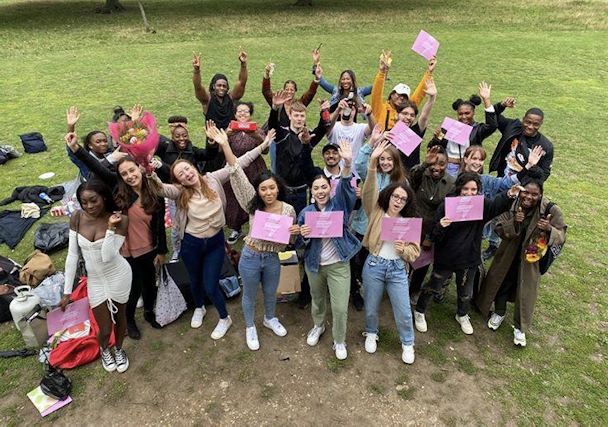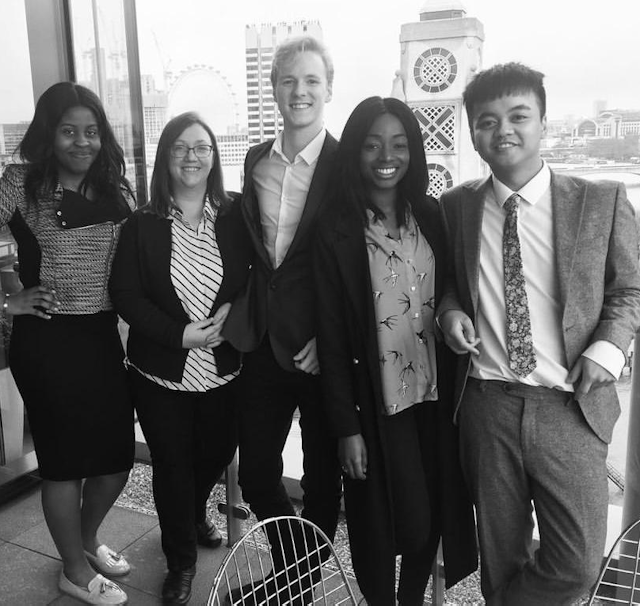Educating Ally: Brixton Finishing School founder on learning to educate yourself on racism
In her new column for The Drum, Ally Owen catches up with individuals from underrepresented backgrounds to understand how she can become a better ally. Emmanuella Owusu-Ansah is her latest guest.

Brixton Finishing School founder Ally Owens speaks to Emmanuella Owusu-Ansah about her experience in the industry
In this series, you’ll get to meet a talent who will share their individual story so we can gain a deeper understanding of their experience and the interventions that will make us a better ally to them.
Today, my latest guest is Emmanuella Owusu-Ansah, currently a programmatic activation executive at Manning Gottlieb OMD.
Emmanuella shares her challenging journey into the industry and mixed experiences, from turning her Zoom camera off due to the discomfort of being the only Black face in a sea of white to feeling valued and respected.
It’s key that we remember it’s a privilege to be able to educate yourself around racism and learn from another’s experience, rather than experiencing it yourself.
Ally: So Emmanuella, thank you for taking the time to speak to me about your experiences. Can you tell us a little bit about your journey into the industry?
Emmanuella: My journey into the advertising industry brought a lot of frustration, to be honest. I felt like no matter how hard I tried, doors were always being closed. I invested my time and energy going to interviews, and was promised feedback that I never got.
It often felt like employees were lacking in the decency to tell me what I could do better, and it meant I couldn’t learn from the mistakes I was making – and that everyone makes when they’re starting out. Everyone’s hiring system is different so it’s hard, and each person hiring has their own perception of what they want, regardless of what is written in the job description.
You did have some older friends in the industry already, which is a rare bonus – what did they do?
One was a creative, and another worked in CRM. They would both help coach me so I’d get interviews. And I did get interviews but I didn’t get the roles. And as the time passed, I needed money – I live in London!
Also, while I was a front desk receptionist, I met an executive creator director and we still talk today. He gave me loads of encouragement and tips. He allowed me to sit in meetings and give ideas on briefs. It was so refreshing! He believed in me and saw potential in me. It helped me believe in myself a bit more, after all the rejections.

I’m interested to know if you have ever had an occasion where you were taken advantage of, despite having a sense of the industry already through these relationships?
Yes! I once worked for an entertainment company and got to know the marketing manager there. A small festival couldn’t afford their services so she suggested they speak to me at reception. I jumped at the chance.
I was told I would be paid to work on their social media in my spare time. I naively thought I would get paid, and didn’t understand I should have had a contract. However, after discussing my ideas with them and starting to create posts for them I found out they already had a social media agency on retainer. After the festival, I asked for payment continuously but I was ignored. I wasn’t paid a penny.
It’s so important that the industry does more to protect those seeking experience and internships from financial abuse. I really admire how you took control of a terrible situation. So how did you come to finally enter the industry?
I knew I wanted to get into advertising, but I didn’t know how. I did the 2020 Change ‘I AM CHANGE’ program. And there was an induction for BFS and there I realized, the ‘how’ turned out to be BFS. I knew I loved advertising and how stories can relate to different types of people and there wasn’t enough representation. I wanted to be part of the change, whether that was on screen or in the industry behind the images we see. When you see someone like you on screen it’s so important. You see someone like yourself and don’t feel invisible. It made a difference for me and I wanted to help others see themselves too.
Then Covid-19 hit and being put on furlough allowed me to do BFS. I then did an internship and started working at Manning Gottlieb OMD, and I am now in the position where I am able to recommend talent to them. This has resulted in two other Black girls who were my contacts getting into programmatic!
When you entered the world of programmatic, did you see an immediate need to improve diversity at all and are you a part of that change?
I could see MGOMD is diverse as a company, but in what I do specifically, in programmatic, there weren’t many Black or Asian people from what I could see. I knew I was in, so I could get girls who look like me in as well. It’s the little things I can help do when it comes to diversity.
I always thought I would have to be chief executive or director before I could enact change. But the director asked me, and as I set a good example, they trusted me to refer. I gave them seven people all together – they asked me about the process and who I thought was best, and they interviewed everyone and picked two. Talking about it now I realise I’ve minimized it in my mind.
You’ve completely minimized it! Did MG quickly understand your value?
Yes they have! And I feel valued and part of them rather than being the ‘other’. Hearing friends’ experiences, they will say: ‘Because I am the only one everyone thinks I speak for all Black people.’ But every Black person’s personal experience is very different, so no one Black person speaks for all.
Do you feel you have to ask for respect that others are automatically given?
Yes. When I’ve been in a senior position, others from a different ethnicity have ignored me unless I’ve brought someone else in. I often found myself becoming rude or standoffish as I was being demeaned and that was the only tone they would respect.
Now I stay calm and don’t play into it. Also, I have in the back of my mind that if I don’t do well in what I am doing the next Black person might not be given a fair chance because of me. I don’t want that. So I’m my sister’s/brother’s keeper.
What a burden and a lot of pressure. Did you ever have an ally in these moments?
In the past I had a manager who was Black, and he would do what he could, but he was experiencing the same. He would ignore those that disrespected him if they asked him for something in the office. He had got to the point of ‘you have no respect for me ever, so I do not need to speak to you’.
From my knowledge, many people feel like if they report something to HR that has to do with race, not much will be done. Especially if the disrespectful person was senior. You learn to navigate around these people. Our manager did his best to protect us, he spoke up for us.
How has this injustice affected you?
It led me, in past internships, to deciding not to turn my camera on so colleagues wouldn’t see I was Black on Zoom meetings. Especially when I was in spaces where I was the only Black face. You see your face standing out against a sea of white. You stand out. Post-BLM, it’s a sensitive time – it’s not helpful to be the only one. That’s definitely not the case now. I do feel confident in showing who I am, even if I am the only Black person on the call.
It must be very painful to be in that situation. What does the industry need to be doing to improve?
Ultimately it’s about hiring more Black people and other ethnicities, recognizing that there is a problem and checking in to see if people are OK.
A colleague once said to me: ‘Seeing you has made me think I should employ more Black people into the company.’ It shouldn’t have taken seeing me in a sea of white to realize what a problem they had. But then I realized that a lot of people don’t put energy into things that don’t affect them. If it was the other way round...
It’s also about having a proper plan in place and not running with the excuse that the company is busy. But it’s about the people at the top. If they aren’t fixated on change then it won’t happen. Companies are there to make money, but you need to make sure the people who make you that money are OK. As well as it being right to treat all employees with equal respect, a contented workforce is much more productive than a distressed one. It’s good business. If I want to get the best out of you at work, I need to make you happier.
What has your experience been like at MG?
It’s been great so far! I’m happy there. The thing that gave me so much reassurance was that when I put on my LinkedIn that I got a job there, a number of Black people from other companies reached out to me and said it was a good place. That made me feel much more confident.
I think it’s important for the industry to realize our networks do talk about companies and we don’t signpost talent to places where we know they won’t thrive. Do they not realize we can choose too? It would be stupid to think we don’t talk. I’ve been told to avoid places and have a list of places where I know there aren’t safe spaces at this point in time. People seem comfortable with being part of the majority and I have to deal with being part of the minority.
Have you seen a slowdown of changemaking post George Floyd?
Yes, definitely – a huge slowdown. Though there are still companies and programs like BFS and 2020 Change that are actively making a choice to try.
Those in power should reach out/respond to those who are reaching out without power. Lean into one Linkedin message request, and leverage that power to help someone else who doesn’t have the same start as you.
Finally, do you have any resource recommendations for people to explore to help them be a better ally?
The Trusted Black Girl: Challenging Perceptions and Maximizing the Potential of Black Women in the UK Workplace is a book I recommend you read to understand the experience of Black women in the UK workplace. There are also a number of really great podcasts as well, such as Black Women Working, Adulting 101 and To My Sisters – give them a listen!
Ally Owen is an industry changemaker and founder of Brixton Finishing School.
If you would like to share your entry-level experiences with Ally and provide further insight into the industry’s practices, please fill out this confidential questionnaire.
